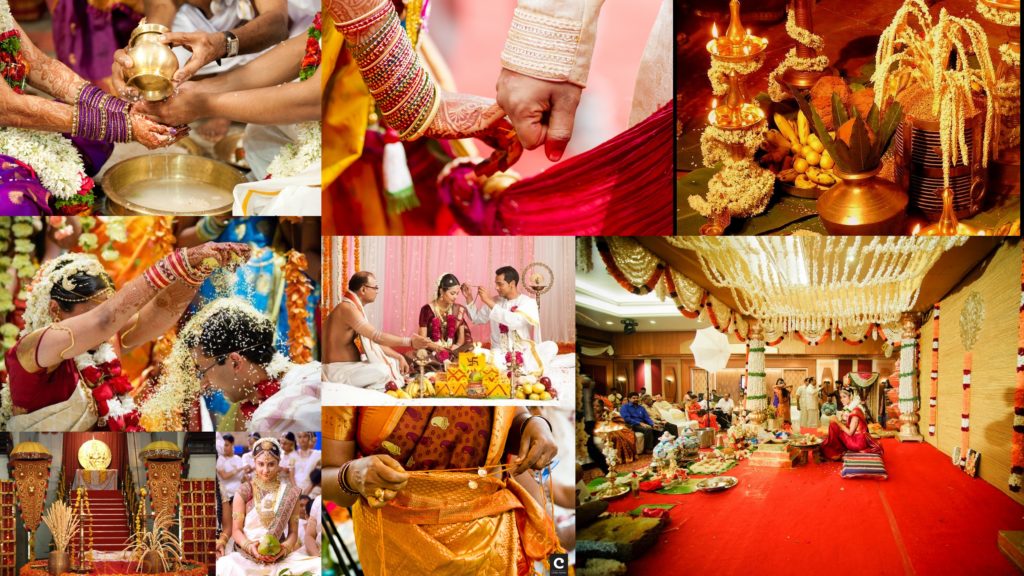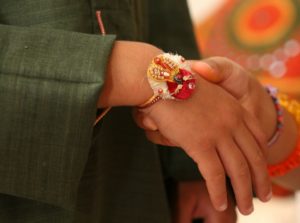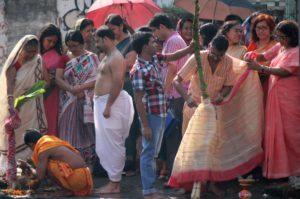Indian Customs and Meanings – a Few out of Many

In doing research for this and other good luck superstitions and customs I found so many terms in Indian customs I never heard of. I can see that it would be a HUGE undertaking to list all of them.
Too many to go into depth here, so I am only giving a few terms here.
Even with these few customs you can tell there has to be a lot of history involved behind these customs. More meanings or definitions may be added as needed.
Rusty Blackbird
Researcher
Raksha Bandhan or Rakhi
 Raksha Bandhan (Hindi, Urdu, the bond of protection), or Rakhi, is a festival primarily observed in North India, which celebrates the relationship between brothers and sisters. The festival is observed by Hindus, Sikhs, and Muslims. The central ceremony involves the tying of a rakhi (sacred thread) by a sister on her brother’s wrist. This symbolizes the sister’s love and prayers for her brother’s well-being, and the brother’s lifelong vow to protect her. The festival falls on the full moon day (Shravan Poornima) of the Shravan month of the Hindu lunisolar calendar.
Raksha Bandhan (Hindi, Urdu, the bond of protection), or Rakhi, is a festival primarily observed in North India, which celebrates the relationship between brothers and sisters. The festival is observed by Hindus, Sikhs, and Muslims. The central ceremony involves the tying of a rakhi (sacred thread) by a sister on her brother’s wrist. This symbolizes the sister’s love and prayers for her brother’s well-being, and the brother’s lifelong vow to protect her. The festival falls on the full moon day (Shravan Poornima) of the Shravan month of the Hindu lunisolar calendar.
Bhaiduj or Bhau-beej
 The festival of Bhai Dooj is popularly known as Bhai Bij, Bhaubeej amongst the Marathi and Konkani speaking communities in the states of Maharashtra,Goa and Karnataka. Just as Bhaidooj celebrations in rest of India, Bhaubeej falls on the last day of five-day-long Diwali festival, on the second day of Diwali. This is the second day of the bright fortnight or Shukla Paksha of Hindu month of Kartika. On Bhaubeej, sisters pray for their brothers to have long and happy lives by performing the Teeka ceremony. Brothers give their sisters Bhav-Bij gifts.
The festival of Bhai Dooj is popularly known as Bhai Bij, Bhaubeej amongst the Marathi and Konkani speaking communities in the states of Maharashtra,Goa and Karnataka. Just as Bhaidooj celebrations in rest of India, Bhaubeej falls on the last day of five-day-long Diwali festival, on the second day of Diwali. This is the second day of the bright fortnight or Shukla Paksha of Hindu month of Kartika. On Bhaubeej, sisters pray for their brothers to have long and happy lives by performing the Teeka ceremony. Brothers give their sisters Bhav-Bij gifts.
Bhaubeej (Bhai Bij) Ceremony
 On the day of Bhaubeej or Bhai Bij sister’s invite their brothers for a sumptuous meal often including their favorite dishes. The whole ceremony signifies the duty of a brother to protect his sister as well as a sisters blessings for her brother.Carrying forward the Bhaubeej ceremony in traditional style, sisters’ perform arti of their brother and apply a red tika on the brother’s forehead. This teeka ceremony, on the occasion of Bhai Bij signifies sister’s sincerest prayers for the long and happy life of her brother. In return brothers bless their sisters and treat them with Bhaubeej or cash gifts.
On the day of Bhaubeej or Bhai Bij sister’s invite their brothers for a sumptuous meal often including their favorite dishes. The whole ceremony signifies the duty of a brother to protect his sister as well as a sisters blessings for her brother.Carrying forward the Bhaubeej ceremony in traditional style, sisters’ perform arti of their brother and apply a red tika on the brother’s forehead. This teeka ceremony, on the occasion of Bhai Bij signifies sister’s sincerest prayers for the long and happy life of her brother. In return brothers bless their sisters and treat them with Bhaubeej or cash gifts.
Bhai Bij Celebration
 Festival of Bhai Bij is quite popular in Gujarat,Maharashtra and Goa and is celebrated with lot of fervour and gaiety. Brothers and sisters look forward to the occasion with immense enthusiasm. To add charm to the occasion Bhai Bij Gifts are exchanged between brothers and sisters as a token of love and appreciation.Bhav Bij is the time for family reunion as all brothers and sisters in the family get together. Close relatives and friends are also invited to celebrate the Bhav Bij in several families.
Festival of Bhai Bij is quite popular in Gujarat,Maharashtra and Goa and is celebrated with lot of fervour and gaiety. Brothers and sisters look forward to the occasion with immense enthusiasm. To add charm to the occasion Bhai Bij Gifts are exchanged between brothers and sisters as a token of love and appreciation.Bhav Bij is the time for family reunion as all brothers and sisters in the family get together. Close relatives and friends are also invited to celebrate the Bhav Bij in several families.
Some Word Meanings
Shankh
 Shankha bhasam, also spelled and pronounced as Shankh and Sankha, is a ritual object, a religious object consisting of a conch shell, a kind of large sea shell. It is the shell of a large predatory sea snail, a marine gastropod mollusc from the Indian Ocean.
Shankha bhasam, also spelled and pronounced as Shankh and Sankha, is a ritual object, a religious object consisting of a conch shell, a kind of large sea shell. It is the shell of a large predatory sea snail, a marine gastropod mollusc from the Indian Ocean.
In Hinduism the Shankha is a sacred emblem of the Hindu preserver god Vishnu. The shankha is still used as a trumpet in Hindu ritual, and was used as a war trumpet in the past. The Shankha is praised in Hindu scriptures as a giver of fame, longevity and prosperity, the cleanser of sin and the abode of Lakshmi – the goddess of wealth and consort of Vishnu.
A powder derived from the Shankha is used in Indian Ayurvedic medicine, primarily as a cure for stomach ailments and for increasing beauty and strength.In the Western world in the English language, the shell of this species is known as the “divine conch” or the “sacred chank”. It may also be simply called a “chank” or conch.







